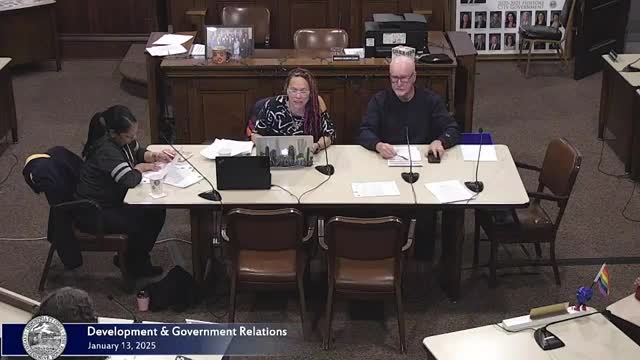Governor’s Councilor Tara Jacobs visits committee to discuss judicial appointments and clemency outreach
Get AI-powered insights, summaries, and transcripts
Subscribe
Summary
Tara Jacobs, the Governor’s Councilor for Western Massachusetts, spoke to the committee about judicial vacancies in Western Mass, efforts to recruit judicial applicants, appeals-court representation, and outreach to increase clemency (pardon) applications.
Tara Jacobs, the governor’s councilor representing Western Massachusetts, visited the Development & Government Relations Committee on Monday to explain the governor’s council’s role and to discuss judicial appointments and clemency outreach.
"I am entering my 2nd term on the governor's council representing 102 cities and towns across all of Western Mass and a little bit of Worcester County," Jacobs told the committee and described the council’s primary duties: advising and consenting to the governor’s judicial nominations, confirming clerk magistrates and parole-board members, and participating in clemency decisions.
Jacobs described a consistent problem: a smaller applicant pool for judicial openings in Western Massachusetts than in eastern Massachusetts. "The Western... mass pool of applicants is much more shallow than the eastern... Compare and I'm talking single digits number of applicants in western mass versus 100 in the eastern seaboard," she said. Jacobs said she has organized events called "Pathway to the Bench" to demystify the appointment process, encourage applications from Western Mass lawyers and foster collaboration between bar associations and the governor's legal office.
She also discussed efforts to increase Western Mass representation on statewide courts such as the Appeals Court, noting that regional equity is one of several factors considered along with qualifications and diversity of legal background. Jacobs said she is advocating for more Western Mass representation on the appeals court and other statewide panels.
On clemency, Jacobs described a November event in Springfield called "Pathway to Pardons" intended to educate residents on the pardon and commutation process and encourage eligible people to apply. She said relatively few people apply for clemency despite potentially large numbers who could benefit: "in the last 3 years... under a 100 people have applied for clemency, about 40 for pardons... and about 60 for commutations." Jacobs said the administration is inclined to use clemency to address systemic injustices and to remove barriers to housing, employment and federal benefits for individuals with historic convictions.
Committee members thanked Jacobs for traveling to Holyoke and asked questions about how the council vets nominees and the limits of the council’s authority once judges are confirmed. Jacobs explained the council has no managerial oversight of judges once they are confirmed and sworn in, though the council can influence values reflected in nominations and is heard during confirmation hearings.
Jacobs also said access to justice — including language access and clear courtroom communication for self-represented litigants — is an important criterion when vetting judicial nominees.
Committee members expressed appreciation for Jacobs’ outreach efforts and encouraged continued engagement with Western Mass bar associations and community groups.
Jacobs said she will visit the Holyoke District and Juvenile Courts in the coming weeks and that the panel discussion in Springfield was recorded and will be made available to interested residents.
